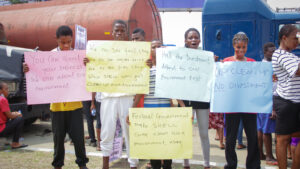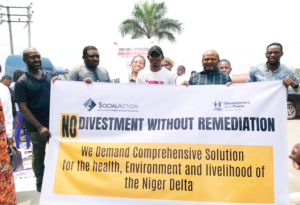Localizing Climate Solutions: A Blueprint for Nigeria’s Sustainable Tomorrow – Welcome Address by Dr Isaac Asume Osuoka
Welcome Address by Dr. Isaac ‘Asume’ Osuoka, Coordinator of Social Action International, Presented by Botti Isaac, Programmes Coordinator of Social Action Nigeria, at the Nigeria Resource Justice Conference 2023, under the theme “Beyond COP 28: Localizing Climate Solutions for Nigeria’s Resilience.” Abuja, FCT. December 18th, 2023.
Distinguished guests, esteemed colleagues, government officials, civil society representatives, academics, and all participants,
Good morning and welcome to the Nigeria Resource Justice Conference 2023, under the theme “Beyond COP 28: Localizing Climate Solutions for Nigeria’s Resilience.”
We convene today in Abuja, not merely as observers of the global climate narrative but as proactive architects of Nigeria’s response to a pressing and existential crisis.
In our prior engagements on climate change, we have stressed the urgency of developing context-specific solutions. Nigeria’s climate crisis is multifaceted, impacting every facet of our lives. The Sahel and the Lake Chad Basin exemplify the acute manifestations of this crisis. The Lake Chad, once a source of livelihood for millions, has diminished drastically, impacting agriculture, fishing, and compounding economic hardships. This environmental degradation is not just an ecological crisis; it is a catalyst for intensified conflicts and banditry, especially in Northern Nigeria. Communities, stripped of their traditional means of survival, find themselves in resource-driven conflicts, exacerbating the region’s fragile security situation.
Furthermore, extreme weather patterns have recently brought about devastating floods across many parts of Nigeria. The 2022 floods were a stark reminder of our vulnerability, with millions affected, homes destroyed, and critical infrastructure damaged. This is not merely a natural disaster; it is a manifestation of climate change, deeply intertwined with the socio-economic fabric of our nation. The flooding has not only led to direct loss of lives and property but has also heightened food insecurity, displacement, and conflict over dwindling resources.
The 28th Conference of Parties to the United Nations Framework Convention on Climate Change (COP 28) recently ended in Dubai, UAE. COP 28 made slow advancements and reprised the challenges of previous COPs in not adequately facing the dangers that we already see.

In the buildup to COP 28, African civil society and countries had several key demands, including more equitable climate finance commitments on the part of countries historically responsible for global emissions, accelerating emissions reduction to align with need, phasing out unabated coal power and fossil fuel subsidies, and implementing the Loss and Damage Fund for vulnerable countries. The final agreement at COP 28 only minimally addressed these demands.
The final text of COP 28 called for a transition from fossil fuels in energy systems but failed to make an explicit commitment to phase them out. The lack of a call for an oil “phaseout” demonstrates the undue influence of the oil and gas lobby.
Concerning financing, the UAE President announced a significant $30 billion fund for global climate solutions, aiming to catalyze further investments, and about $700 million pledge to assist lower-income countries with climate-induced loss and damage, and an agreement among 118 countries to increase renewable power generation and energy efficiency significantly.
However, financing plans are still mostly tied to the carbon market business that threaten to mortgage forest resources in Africa and other poor countries, as we have seen through REDD+ schemes that have been demonstrated as failures, including the experience in Cross River State.
At this juncture, we must confront a crucial aspect of our climate challenge – the role of Nigeria’s petroleum industry. As a nation, we cannot shy away from the fact that our petroleum sector, marked by gas flaring and environmental pollution, significantly contributes to the climate crisis. The key findings of the Bayelsa State Oil & Environmental Commission (BSOEC) report have shed new light on the profound environmental and health impacts of oil extraction and gas flaring in the Niger Delta.
The 2023 Bayelsa State Oil & Environmental Commission (BSOEC) report highlights the severe environmental, health, and socio-economic impacts of oil industry activities in Nigeria. Over five decades, pollution has led to a health crisis, with increased cases of cancer, diabetes, Alzheimer’s, and up to 16,000 infant deaths annually in Bayelsa alone. Economically, the destruction of fishing and farming livelihoods has plunged millions into poverty, while resource disputes disrupt community cohesion. The report also found high levels of toxic chemicals and heavy metals like lead, nickel, and cadmium in the environment, posing severe health risks. In certain areas affected by oil industry activities, the level of toxic contaminants in groundwater is alarmingly high. For instance, chromium, a highly toxic oil-related contaminant, has been found at concentrations exceeding the World Health Organization’s (WHO) safety limits by over 1,000 times. Inadequate clean-up efforts by oil companies further exacerbate the situation. Furthermore, gas flaring intensifies air pollution and causes acid rain, damaging crops and soil.

These revelations bring to the fore the critical issue of a just transition in Nigeria. We need to look beyond petroleum. As we deliberate on climate action strategies, we must recognize that energy access is a fundamental human right. Our transition to a greener economy must be equitable, taking into account the needs of all Nigerians, particularly those who have borne the brunt of environmental degradation due to fossil fuel extraction. This transition should address emissions reduction and ensure that communities affected by the petroleum industry are not left behind.
The outcomes of COP 28 bring both challenges and opportunities for Nigeria. Adaptation measures, climate finance, and technology transfer are essential for our national climate action plan. However, these must be implemented in ways that do not exacerbate existing inequalities or environmental injustices. Our strategies should be inclusive, promoting sustainable development and recognizing the ecological debt owed to affected communities.
This conference aims to translate the global commitments from COP 28 into actionable, locally relevant strategies for Nigeria. Our focus spans formulating civil society strategies post-COP 28, strengthening our climate policies, securing financial and technological support for climate action, enhancing institutional capacities for climate governance, and addressing the imperative of a just and inclusive transition to green energy.
The diversity of participants here today enriches our discussions and underscores the collective will to address these challenges. Your insights, expertise, and commitment are crucial in crafting a unified response to the climate crisis.
As we proceed with today’s agenda, let us engage constructively, think innovatively, and collaborate effectively. Our goal is to pave the way for a resilient Nigeria that can withstand climate challenges and thrive towards sustainable development.
Thank you for your presence and dedication to this vital cause. Together, let us make this conference a significant milestone in Nigeria’s journey towards climate resilience and justice.





